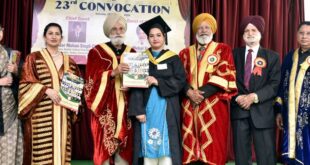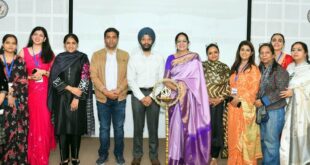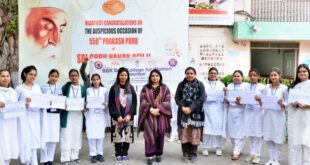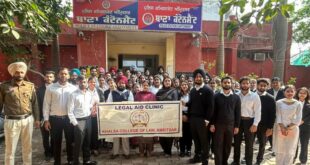New Delhi. Feb. 9 (Punjab Post Bureau) – The Central Government, through the centrally sponsored schemes of  Sarva Shiksha Abhiyan (SSA) and Rashtriya Madhyamik Shiksha Abhiyan (RMSA) supports the States and UTs on several interventions to improve quality, including regular inservice teachers’ training, induction training for newly recruited teachers, training on ICT Component, Inclusive Education, Gender Sensitization and Adolescent Education.Under both SSA and RMSA, the focus is to give subject specific, need based and relevant in service teacher training to both elementary and secondary teachers for their professional development.
Sarva Shiksha Abhiyan (SSA) and Rashtriya Madhyamik Shiksha Abhiyan (RMSA) supports the States and UTs on several interventions to improve quality, including regular inservice teachers’ training, induction training for newly recruited teachers, training on ICT Component, Inclusive Education, Gender Sensitization and Adolescent Education.Under both SSA and RMSA, the focus is to give subject specific, need based and relevant in service teacher training to both elementary and secondary teachers for their professional development.
Moreover, interventions like motivation and awareness programmes, remedial teachingare also supported under RMSA to improve quality of school education at secondary level. Further, interventions such as Science fair/Exhibition and Talent Search at district level; mathematics and science kits to schools, visit of students to higher institution and learning enhancement of students are also approved.
The Central Government has been consistently pursuing the matter of expeditious recruitment and redeployment of teachers and to implement norms of the RTE Act 2009 with the States and UTs at various forums. Advisories have also been issued to States and UTs from time to time to implement the norms of the RTE Act and for redeployment of teachers to ensure that all school teachers should spend adequate time serving in rural areas through a transparent policy. Further, the Government has initiated the following steps to make school education qualitative:
Shagun portal has been launched to create a repository of best practices in school education and to monitor the implementation of SSA;
Swachh Vidyalaya Campaign for the provisions of separate toilets for girls and boys in every school;
Swachh Vidyalaya Puraskar was instituted from 2016-17 at District, State and national level as a next step to Swachh Vidyalaya initiative;
Padhe Bharat Badhe Bharat was launched in 2014 to ensure that students of classes I & II are able to read with comprehension as well as basic numeracy skills;
Rashtriya Avishkar Abhiyan was launched in 2015 to motivate children of the age- group of 6-18 years in study of Science, Mathematics and technology;
The Right of Children to Free and Compulsory Education (RTE) Act has been amended in February, 2017 to include reference on class-wise, subject-wise Learning Outcomes to ensure that all children acquire appropriate learning level;
Section23 (2) of the RTE Act has been amended in August, 2017, to extend the period of in-service training for untrained elementary teachers to 31st March, 2019 to ensure all teachers acquire minimum qualifications as laid down by the academic authority;
E-pathshala webportal (http://epathshala.gov.in/) and mobile apps (Android, iOS and Windows) have been launched in November 2015 to disseminate e-resources including e-books developed by NCERT, SCERT/ SIEs, State boards etc;
Shaala Siddhi is a comprehensive instrument for school evaluation leading to school improvement, which was launched in November, 2015;
Kala Utsav programme has been started to promote arts in education by nurturing and showcasing the artistic talent of school students at the secondary stage;
An Online Project Monitoring System (PMS), for online managment and monitoring of RMSA has been enabled from August 2014,
Distribution of tablets preloaded with relevant e content in Kendriya Vidyalayas has been started on a pilot basis to connect students and their teachers for effective learning; Also, 93 Kendriya Vidyalayas (KVs) have been started during last 3 years and 62 new Navodaya Vidyalas have been sanctioned.
Automated Monitoring System at the school level under Mid Day Meal Scheme has been introduced for real time monitoring of the scheme;
A National Achievement Survey (NAS) based on learning outcomes has been conducted on 13th November, 2017 for classes III, V & VIII with a sample frame upto district level to enable states/UTs to identify gaps. At the secondary level (Class X), NAS was conducted for the first me at national level covering 33 States/UTs. According to the survey, the achievement of girls in class X (Cycle-1) is at par with the boys in all subjects. The second cycle of NAS for class X has been conducted on 5th February, 2018, with a district level sampling frame.
This information was given by the Minister of State (HRD), Shri Upendra Kushwaha today in a written reply to a Rajya Sabha question.
 Punjab Post Daily Online Newspaper & Print Media
Punjab Post Daily Online Newspaper & Print Media





